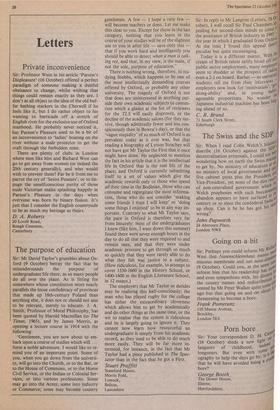The purpose of educati i on
Sir: Mr David Taylor's grumbles about Ox- ford (9 October) betray the fact that he
misunderstands the purpose of undergraduate life there, as so many people do all over the place. As is fitting for somewhere whose constitution more nearly parallels the loose confederacy of provinces that made up 18th-century Poland than anything else, it does not or should not aim to be relevant, merely to educate. J. A. Smith, Professor of Moral Philosophy, has been quoted by Harold Macmillan (in The Times, 1965), and by James Morris, as opening a lecture course in 1914 with the following:
`Gentlemen, you are now about to em- bark upon a course of studies which will ... form a noble adventure. I would like to re- mind you of an important point. Some of you, when you go down from the universi- ty, will go into the Church, or to the Bar, or to the House of Commons, or to the Home Civil Service, or the Indian or Colonial Ser- vices, or into various professions. Some may go into the Army, some into industry or Commerce; some may become country
gentlemen. A- few — I hope a very few will become teachers or dons. Let me make this clear to you. Except for those in the last category, nothing that you learn in the course of your studies will be of the slightest use to you in after life — save only this that if you work hard and intelligently you should be able to detect when a man is talk- ing rot, and that, in my view, is the main, if not the sole, purpose of education.'
There is nothing wrong, therefore, in stu- dying Stubbs, which happens to be one of the most intellectually demanding courses offered by Oxford, or probably any other university. The tragedy of Oxford is not that dons are uninterested in anything out- side their own academic subjects (a conten- tion which a glance at the list of reviewers for the TLS will easily disprove), or the decline of the academic salons (for they sur- vive, though admittedly fewer and less con- spicuously than in Bowra's day), or that the `vague stupidity' of so much of Oxford is as prevalent today as it ever was, but that reading a biography of Lytton Strachey will not have got Mr Taylor the First that it once might have done. He neglected to mention the fact in his article that it is the intellectual life in Oxford that is the real life of the place; and Oxford is currently submitting itself to a set of values which give the academic rewards only to those who spend all their time in the Bodleian, those who can consume and regurgitate the most informa- tion, those who do not consider 'making some friends I trust I will keep' or 'doing some things I enjoyed' to be in any way im- portant. Contrary to what Mr Taylor says, the pace in Oxford is therefore very far from leisurely: most of the undergraduates I knew (like him, I went down this summer) found there were never enough hours in the day to do all that they were required to and remain sane, and that they were under academic pressure to get through so much so quickly that they were rarely able to do what they felt was justice to a subject. (How ridiculous, for example, to attempt to cover 1330-1660 in the History School, or 1400-1600 in the English Literature School, in 12 essays.) The employers that Mr Taylor so derides may be realising this half-consciously; the man who has played rugby for the college has either the extraordinary cleverness which allows him to get by academically and do other things at the same time, or the wit to realise that the system is ridiculous and he is largely going to ignore it. They cannot now learn how resourceful an undergraduate is simply from his academic record, as they used to be able to do much more easily. They will be far more in- terested, for instance, in the fact that Mr Taylor had a piece published in The Spec- tator than in the fact that he got a First.
Stuart Proffitt
Stamford House, Morris Fold, Lostock, Bolton, Lancashire










































 Previous page
Previous page